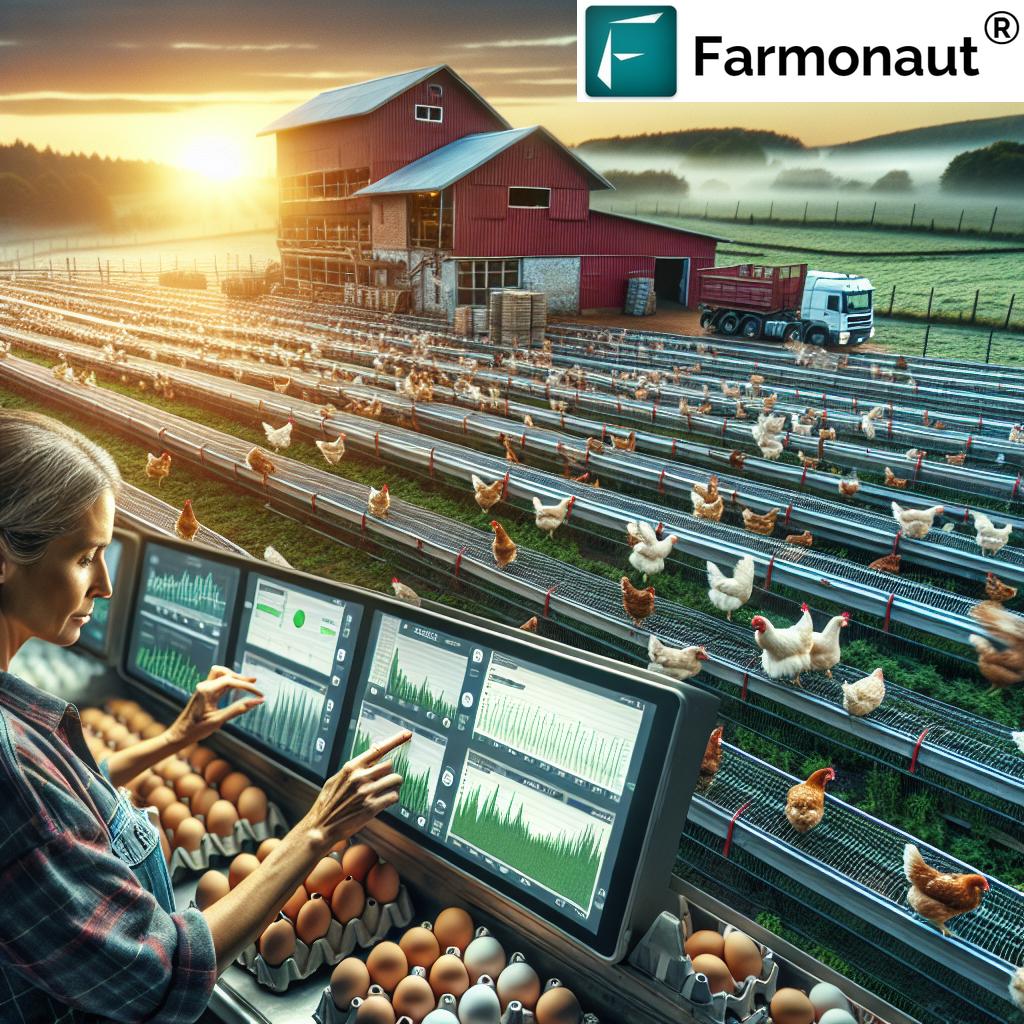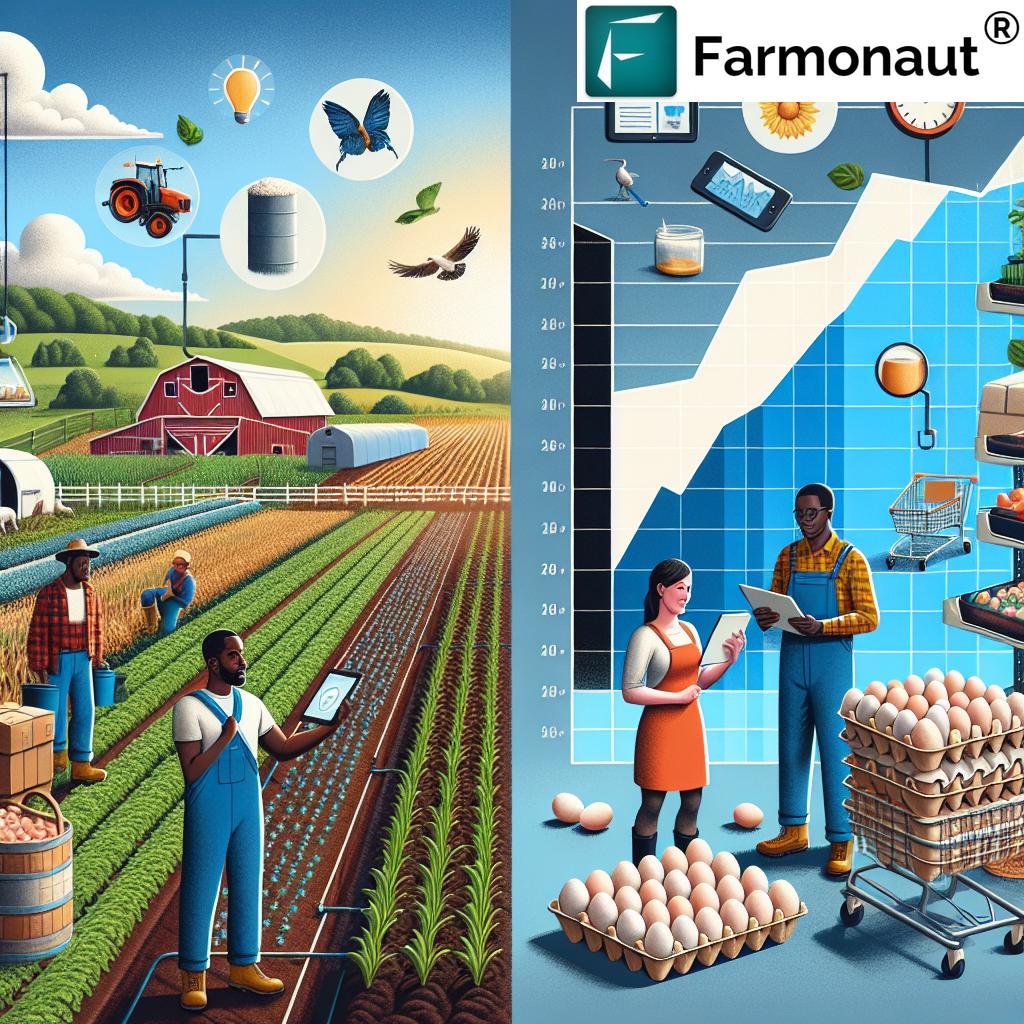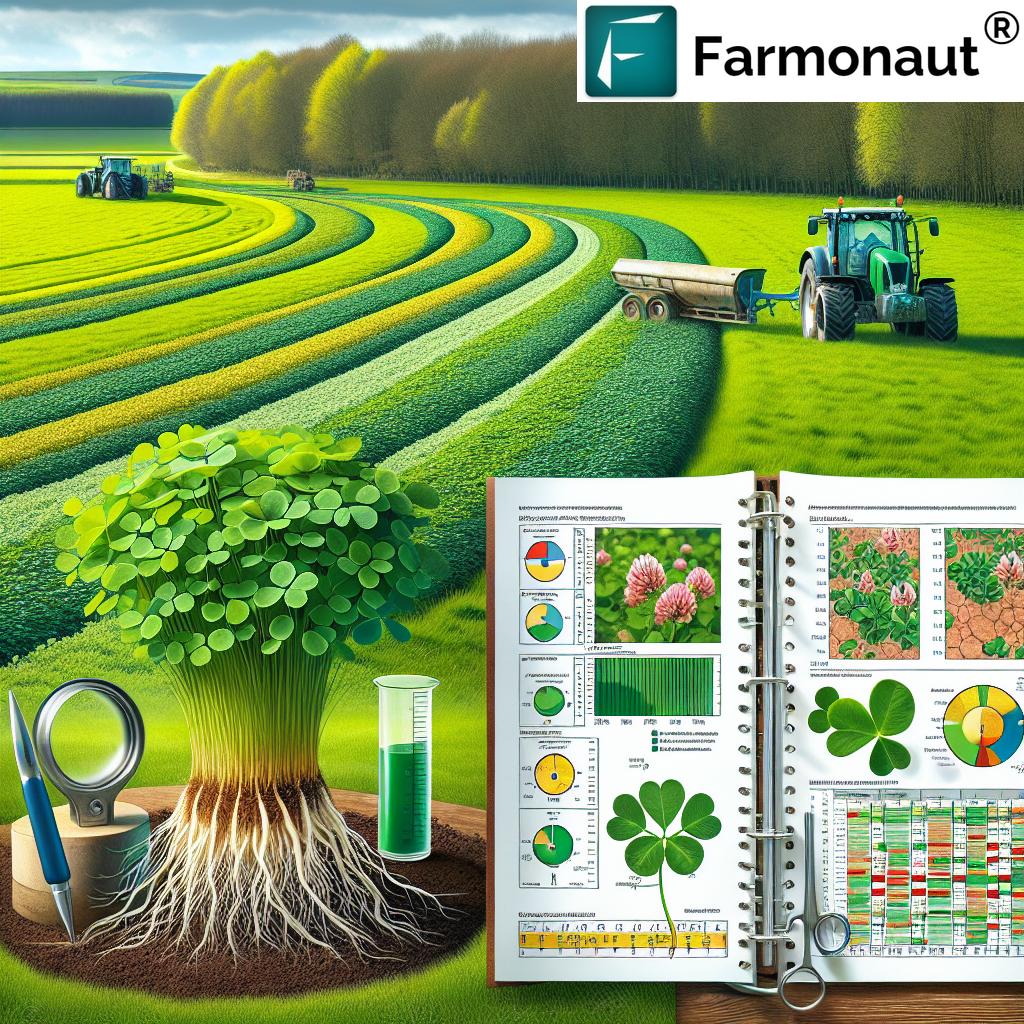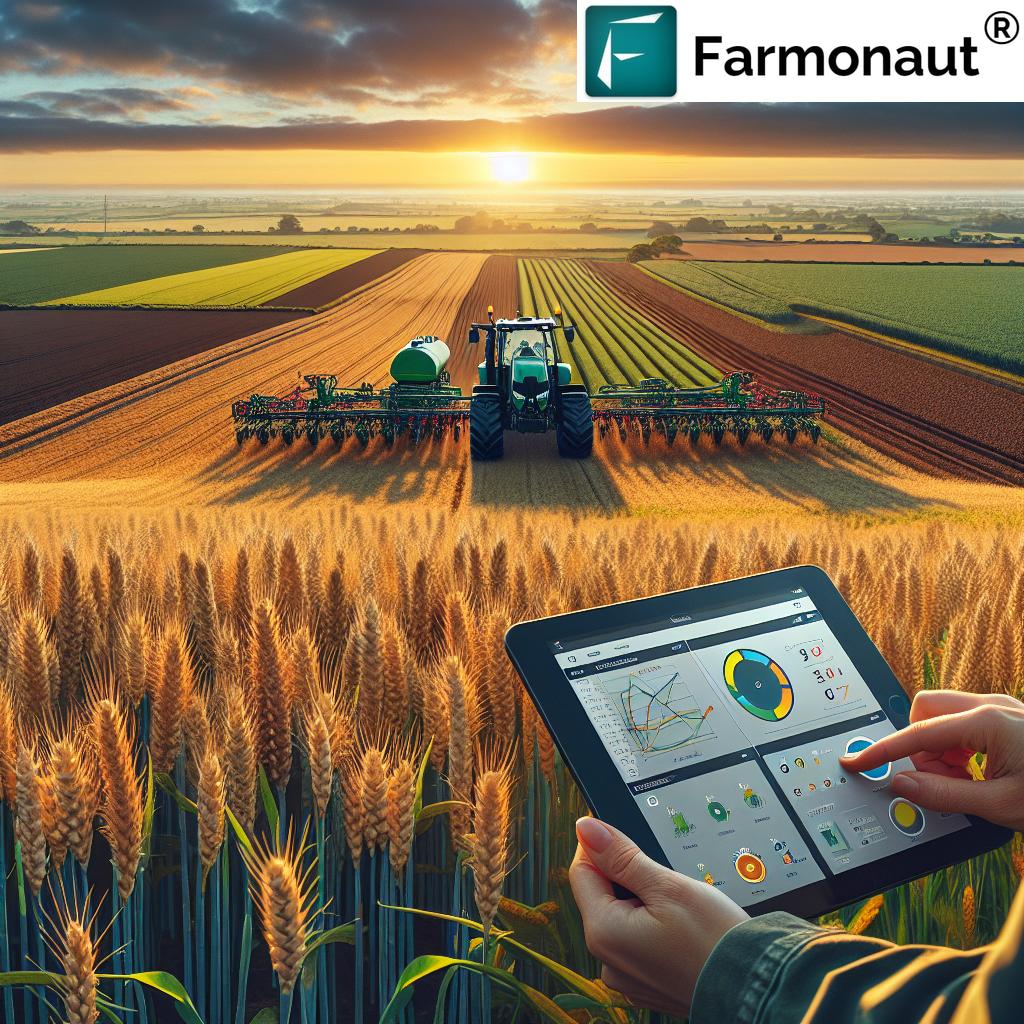UK Egg Crisis: How Farmonaut’s Toolkit Can Support Local Farmers Amid Supply Chain Challenges

“UK egg crisis led to supermarkets importing eggs, impacting over 10,000 local poultry farmers.”
In recent months, the United Kingdom has found itself grappling with a significant challenge in its agricultural sector – the UK egg supply crisis. This pressing issue has sent ripples through the farming community, supermarkets, and consumers alike, highlighting the delicate balance of our food supply chains and the crucial role of local farmers in ensuring food security. As we delve into this complex situation, we’ll explore how innovative solutions, such as Farmonaut’s advanced toolkit, can step up to support local farmers during these turbulent times.
Understanding the UK Egg Supply Crisis
The egg supply crisis in the UK is a multifaceted issue stemming from various factors, including:
- Increased production costs due to rising feed and energy prices
- Outbreaks of avian influenza affecting poultry flocks
- Labor shortages in the agricultural sector
- Challenges in maintaining sustainable agriculture practices amid economic pressures
These factors have culminated in a perfect storm, leading to a significant reduction in domestic egg production. As a result, some major supermarkets have made the controversial decision to import eggs rather than relying solely on local sources. This decision has sparked a heated debate about supporting local farmers, food security, and the long-term implications for UK agriculture.
The Impact on Local Farmers and Food Production
The decision to import eggs has had far-reaching consequences for local food production and the farming community:
- Reduced demand for locally produced eggs, putting financial strain on UK farmers
- Potential long-term impact on the viability of small and medium-sized poultry farms
- Concerns about maintaining high animal welfare standards and traceability
- Challenges in preserving local farming traditions and rural economies
These impacts underscore the importance of supporting local farmers and maintaining a robust domestic agricultural industry. As we navigate these challenges, it’s crucial to explore innovative solutions that can help farmers adapt and thrive.
The Role of Technology in Addressing Agricultural Challenges
In the face of these challenges, technology emerges as a powerful ally for farmers. Advanced agricultural technologies can help improve efficiency, reduce costs, and enhance sustainability. This is where Farmonaut’s toolkit comes into play, offering a range of solutions designed to support farmers through these difficult times.
Farmonaut’s advanced crop monitoring and farm management tools provide farmers with valuable insights that can help them navigate the complexities of modern agriculture. By leveraging satellite imagery, artificial intelligence, and data analytics, Farmonaut empowers farmers to make informed decisions about their operations.
How Farmonaut’s Toolkit Supports Local Farmers
Farmonaut’s suite of tools offers several key benefits to farmers facing supply chain challenges:
- Real-time Crop Health Monitoring: Using satellite imagery, farmers can track the health of their crops, identifying potential issues before they become critical.
- Resource Optimization: AI-driven insights help farmers optimize their use of water, fertilizers, and other inputs, reducing costs and improving sustainability.
- Weather Forecasting: Accurate weather predictions allow farmers to plan their activities more effectively, reducing the risk of crop damage.
- Market Insights: By providing data on agricultural market fluctuations, Farmonaut helps farmers make informed decisions about when to sell their produce.
These tools are particularly valuable in the context of the egg supply crisis, as they can help poultry farmers optimize their operations and potentially reduce production costs.
“Farmonaut’s toolkit can potentially increase farm efficiency by up to 20% during supply chain challenges.”
Sustainable Agriculture Practices and Food Security
The egg supply crisis has brought the importance of sustainable agriculture practices and food security into sharp focus. As we consider the long-term implications of relying on imported eggs, it’s clear that supporting local farmers and promoting sustainable farming methods are crucial for ensuring a stable food supply.
Farmonaut’s toolkit aligns with these goals by:
- Promoting efficient use of resources, reducing the environmental impact of farming
- Enabling precision agriculture techniques that can increase yields while minimizing waste
- Providing data-driven insights that support sustainable decision-making
- Facilitating traceability in the supply chain, enhancing food safety and consumer confidence
By leveraging these tools, local farmers can work towards more sustainable and resilient agricultural practices, contributing to long-term food security in the UK.
Diversification Strategies for UK Farmers
In light of the challenges posed by the egg supply crisis, diversification emerges as a crucial strategy for UK farmers. Farmonaut’s toolkit can support farmers in exploring and implementing diversification strategies:
- Crop Rotation: Utilizing satellite imagery and AI-driven insights to identify optimal crop rotation patterns.
- Mixed Farming: Providing data-driven recommendations for integrating livestock and crop production.
- Value-Added Products: Offering market insights to help farmers identify opportunities for creating value-added products from their primary produce.
- Agritourism: Supporting land use planning for farmers looking to diversify into agritourism activities.
By diversifying their operations, farmers can reduce their reliance on a single product, such as eggs, and create more resilient and sustainable farm enterprises.
Explore Farmonaut’s API for advanced agricultural data
The Importance of Local Sourcing and Supply Chain Management
The decision by some supermarkets to import eggs rather than source locally has highlighted the critical importance of robust supply chain management in agriculture. While importing may seem like a quick solution to shortages, it comes with several drawbacks:
- Increased carbon footprint due to long-distance transportation
- Potential compromises in egg freshness and quality
- Reduced traceability and accountability in the supply chain
- Economic impact on local farming communities
Farmonaut’s toolkit can play a crucial role in improving local supply chain management by:
- Enhancing communication between farmers and retailers through data sharing
- Providing accurate yield predictions to help manage supply and demand
- Offering traceability solutions that can boost consumer confidence in local produce
- Supporting efficient resource allocation to reduce costs and improve competitiveness
By strengthening local supply chains, we can work towards a more resilient and sustainable food system that benefits farmers, retailers, and consumers alike.

Comparing Local Production vs. Imports
To better understand the implications of importing eggs versus supporting local production, let’s examine a comparison table:
| Factors | Local UK Egg Production | Imported Eggs |
|---|---|---|
| Average Carbon Footprint (estimated kg CO2e per dozen) | 2.5 | 4.2 |
| Transportation Distance (estimated km) | 100-300 | 1000-3000 |
| Freshness (estimated days from production to shelf) | 1-3 | 5-10 |
| Price to Consumers (estimated £ per dozen) | 2.50-3.50 | 2.00-3.00 |
| Support for Local Economy (estimated % of price) | 70-80% | 10-20% |
| Traceability | High | Medium to Low |
This comparison clearly illustrates the benefits of supporting local egg production, particularly in terms of environmental impact, freshness, and economic support for local communities.
The Future of UK Farming and Food Security
As we look to the future, it’s clear that addressing the challenges highlighted by the egg supply crisis will be crucial for ensuring the long-term viability of UK farming and national food security. Key areas of focus should include:
- Investing in technological innovations to improve farm efficiency and sustainability
- Developing policies that support local farmers and encourage sustainable practices
- Strengthening domestic supply chains to reduce reliance on imports
- Educating consumers about the importance of supporting local food production
- Promoting diversification and resilience in farming operations
Farmonaut’s toolkit is well-positioned to support these efforts by providing farmers with the tools and insights they need to adapt to changing market conditions and environmental challenges.
Access Farmonaut’s API Developer Docs for integration insights
Conclusion: Empowering Farmers for a Resilient Future
The UK egg supply crisis has brought to light the complex challenges facing our agricultural sector and the critical importance of supporting local farmers. As we navigate these turbulent times, innovative solutions like Farmonaut’s toolkit offer a beacon of hope, providing farmers with the tools they need to adapt, thrive, and ensure a stable food supply for the future.
By embracing technology, promoting sustainable practices, and strengthening local supply chains, we can work towards a more resilient and secure food system. The journey ahead may be challenging, but with the right tools and support, UK farmers can overcome these obstacles and continue to play their vital role in feeding the nation.
As consumers, policymakers, and industry stakeholders, we all have a part to play in supporting our local farmers and ensuring the long-term sustainability of UK agriculture. By choosing local produce, advocating for supportive policies, and investing in innovative agricultural technologies, we can help build a stronger, more resilient farming sector that benefits us all.
FAQ Section
Q: What caused the UK egg supply crisis?
A: The crisis was caused by a combination of factors, including increased production costs, avian influenza outbreaks, labor shortages, and challenges in maintaining sustainable agriculture practices amid economic pressures.
Q: How does importing eggs affect local farmers?
A: Importing eggs can reduce demand for locally produced eggs, putting financial strain on UK farmers and potentially impacting the long-term viability of small and medium-sized poultry farms.
Q: How can Farmonaut’s toolkit help farmers during this crisis?
A: Farmonaut’s toolkit offers real-time crop health monitoring, resource optimization, weather forecasting, and market insights, helping farmers improve efficiency, reduce costs, and make informed decisions.
Q: What are some diversification strategies for UK farmers?
A: Diversification strategies include crop rotation, mixed farming, developing value-added products, and exploring agritourism opportunities.
Q: How can consumers support local farmers during this crisis?
A: Consumers can support local farmers by choosing locally produced eggs and other products, even if they might be slightly more expensive than imported alternatives.




















